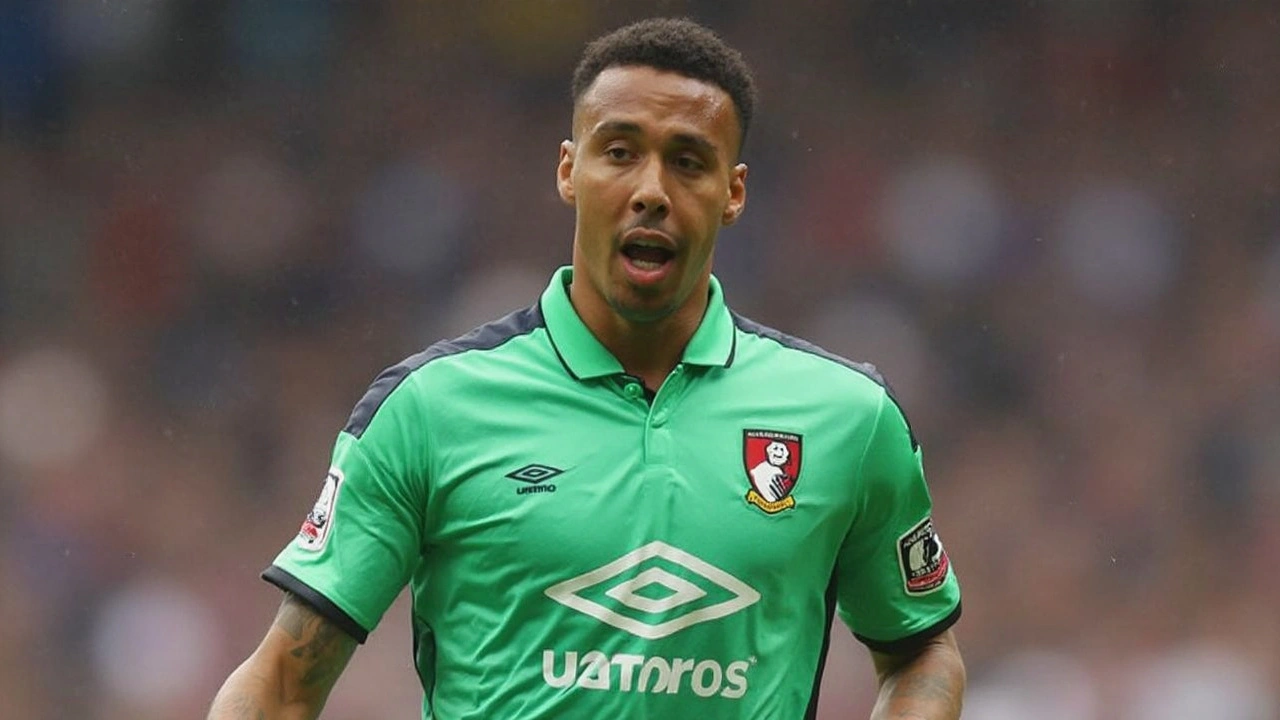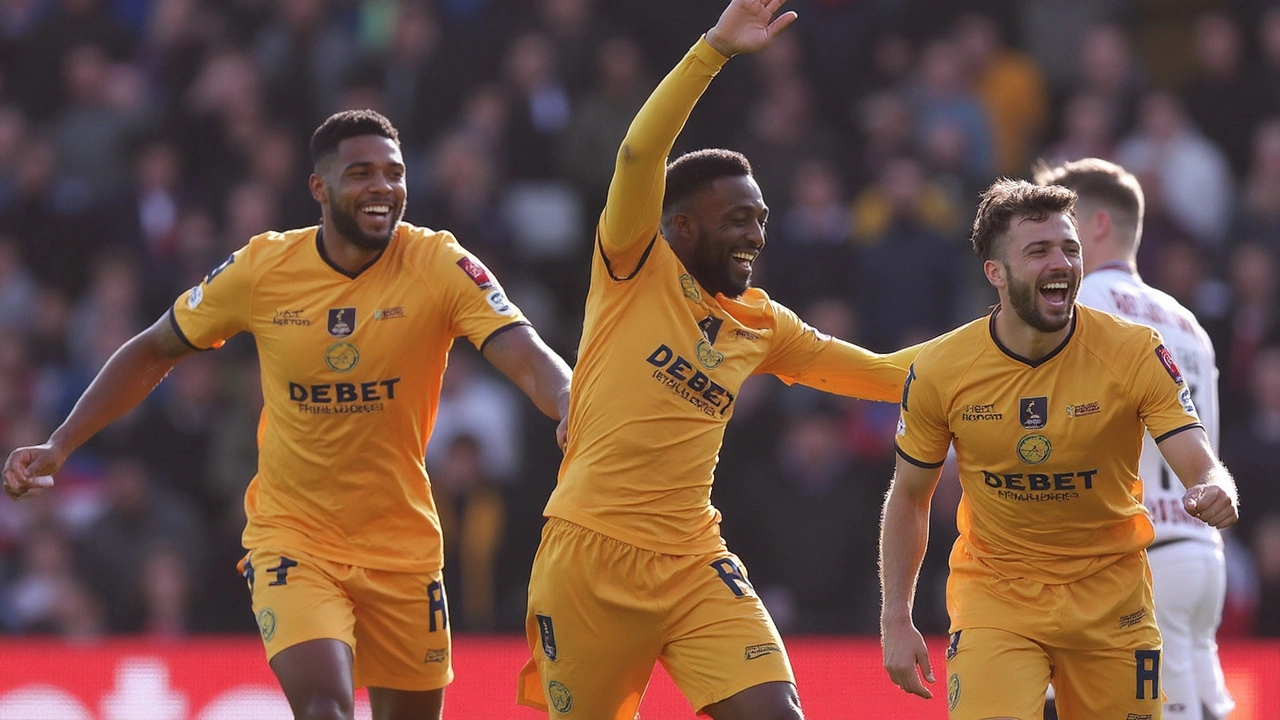Wolves Gain Crucial Win Against Bournemouth
Wolverhampton Wanderers emerged victorious with a slender 1-0 win against Bournemouth on the 22nd of February 2025, in what proved to be a crucial Premier League fixture. The game, filled with drama and pivotal moments, saw Matheus Cunha score the decisive goal in the 36th minute. This win moved Wolves five points clear from the dreaded relegation zone—a significant boost for the team's morale and future fixtures.
The game took a major turn when Bournemouth found themselves reduced to ten men. Illia Zabarnyi's rough challenge on Rayan Ait-Nouri didn't just change the game's dynamic but also handed Bournemouth a hefty setback in their ambitions for a top-four finish. His initial yellow card offense turned red after a VAR review, leaving the Cherries to play most of the match shorthanded. Despite their numerical disadvantage, Bournemouth's determination to make a comeback was evident, but Wolves took control, leveraging their advantage effectively.

Impact on Both Teams' Prospects
Bournemouth, who entered the match sitting in fifth place, were hoping to solidify their spot among the Premier League's top teams. The defeat at home, their first in seven matches, will weigh heavily as they chase a place in next season's Champions League. Meanwhile, Wolves showed resilience by keeping a clean sheet, largely due to their solid defensive play and Jose Sa’s decisive saves. This win reinforced their belief in avoiding relegation pain.
After the game, Wolves' manager Vitor Pereira lauded his team's composure and 'true spirit,' a sentiment echoed by players and fans alike. The victory also extends their unbeaten record against Bournemouth to five consecutive games, marking a significant achievement against a strong adversary. On the flip side, Bournemouth’s manager, Andoni Iraola, acknowledged the difficulty of playing one man down but expressed immense pride in his squad's perseverance during the match.
Key stats from the match revealed interesting narratives as well: Cunha notched his 13th goal of the season and scored in three consecutive league matches for the first time, underlining his critical role for the team. Zabarnyi's sending off was a turning point and notably influenced the outcome of the game.
As the league progresses, both Wolves and Bournemouth will need to reflect on this encounter. For Wolves, it means building upon this vital win, while Bournemouth must regroup and focus on their remaining fixtures to keep their European dreams alive.




Wolves snatching that win was a proper surprise, especially with Cunha pulling the trigger early. The red card on Zabarnyi really swung the momentum, and Bournemouth never seemed to recover. It’s a reminder how a single mistake can change the whole season for teams chasing the top four.
When you consider the philosophical weight of a red card, you realize it’s not just a punishment but a manifestation of chaos disrupting order on the field. The aggression shown by Zabarnyi, albeit reckless, reflects the desperation of a side fighting for a Champions League berth. And yet, Wolves’ composure under pressure illustrates a strategic elegance that transcends mere physicality. The match becomes a micro‑cosm of life’s struggle between impulsive fury and disciplined resolve.
The fixture between Wolverhampton Wanderers and Bournemouth on February 22, 2025, will be remembered as a pivotal moment in the Premier League narrative. Matheus Cunha's 36th‑minute goal not only provided the decisive margin but also marked his thirteenth strike of the campaign, highlighting his emergent role as a consistent finisher. While the goal itself was a moment of brilliance, the broader context reveals a deeper story of tactical discipline and psychological resilience.
Wolves entered the match with a clear objective: to secure three points and distance themselves from the relegation peril that has haunted them in recent seasons. Their defensive organization, anchored by the impressive performances of their goalkeeper Jose Sa, proved vital in maintaining a clean sheet against a Bournemouth side that had previously dazzled with attacking flair. Sa's saves, especially in the closing stages, underscored the importance of a reliable last line of defense when playing with a narrow lead.
Conversely, Bournemouth arrived at the Vitality Stadium with aspirations of consolidating a top‑four position, having occupied fifth place prior to the encounter. Their ambition was evident in the early pressure they applied, seeking to unsettle Wolves and carve out scoring opportunities. However, the tactical misstep by Illia Zabarnyi, resulting in a reckless challenge on Rayan Ait‑Nouri, became the turning point that shifted the game's momentum.
The VAR review that escalated a yellow card to a straight red not only reduced Bournemouth to ten men but also symbolized a loss of composure at a crucial juncture. Playing a man down for the majority of the match forced the Cherries to adapt their game plan, pushing them onto the back foot and limiting their ability to sustain attacks. Despite moments of determination and a visible desire to claw back into the contest, they were thwarted by Wolves' strategic exploitation of the numerical advantage.
Vitor Pereira's post‑match praise for his squad's composure reflects a broader managerial philosophy that values mental fortitude alongside technical skill. His acknowledgment of the 'true spirit' demonstrated by his players resonates with the idea that psychological resilience can be as decisive as tactical acumen. Andoni Iraola, the Bournemouth manager, while understandably proud of his team's perseverance, conceded that the red card was a significant detriment to their top‑four aspirations.
The statistical overview of the match provides additional layers of insight. Cunha's goal contributed to a streak of three consecutive league goals, a personal milestone that underscores his rising influence. The red card incident also highlighted the critical role of disciplinary measures in modern football, where VAR interventions can dramatically alter outcomes. Moreover, Wolves' unbeaten run against Bournemouth-now five matches-serves as a testament to their ability to consistently manage this specific opponent.
Looking ahead, Wolves can build on this victory, using it as a catalyst to further solidify their position away from relegation worries. For Bournemouth, the defeat serves as a cautionary tale, emphasizing the need to maintain discipline and composure in high‑stakes matches if they wish to sustain a realistic challenge for Champions League qualification. The season remains long, but this encounter will undoubtedly influence the strategic calculations of both clubs moving forward.
Wolves really showed their grit, y'know? Even with a pinhole defense, they kept that clean sheet. The red card was a real bummer for Bournemouth, but it shows how a single moment can flip the whole game. Good luck both sides for the rest of the season!
From a tactical perspective, Wolves' disciplined pressing and compact shape were instrumental in neutralizing Bournemouth's attack after the sending‑off. The decision by the referee to send off Zabarnyi, reinforced by VAR, underscores the growing emphasis on player safety and maintaining fairness on the pitch. Additionally, the psychological impact of playing a man down cannot be overstated; it forces a team to adjust its formation and often leads to more defensive errors. The match serves as a case study in how discipline and strategic adaptability can dictate outcomes in high‑stakes fixtures.
Yo, that win was fire! Wolves riding that momentum hard-time to keep that energy going. And those fans? Pure hype, they deserve a shoutout for the vibe. Let's see if Bournemouth can bounce back though, they need that fire too.
OMG!! Wolves absolutely crushed it!! 🐺⚽️ And that red card? So dramatic!! 🎭 Can't wait for the next match!! Remember to celebrate responsibly!!
Honestly, the aggression from Zabarnyi was out of line, but it's a teaching moment for every player who thinks they can get away with reckless challenges. When the referee draws the line, the whole team feels the ripple effect-it’s not just a personal setback, it’s a collective burden.
Just another day, another win.
This match was cool. Wolves got the win and Bournemouth messed up.
Red cards change destiny.
Indeed, the statistical probability of a team winning after a red card in the first half is significantly higher, as evidenced by multiple case studies in top‑flight leagues. This underscores the strategic importance of discipline and the impact of early foul management on match outcomes.